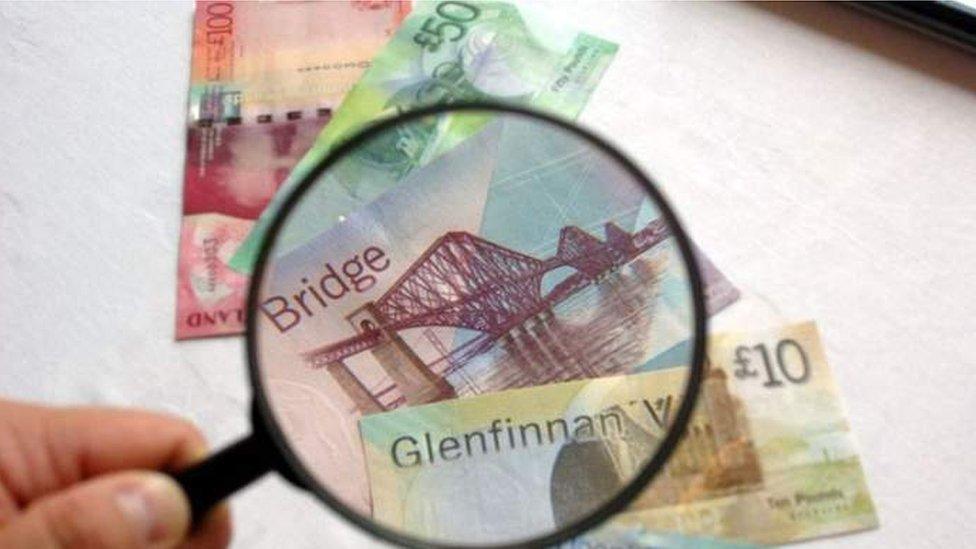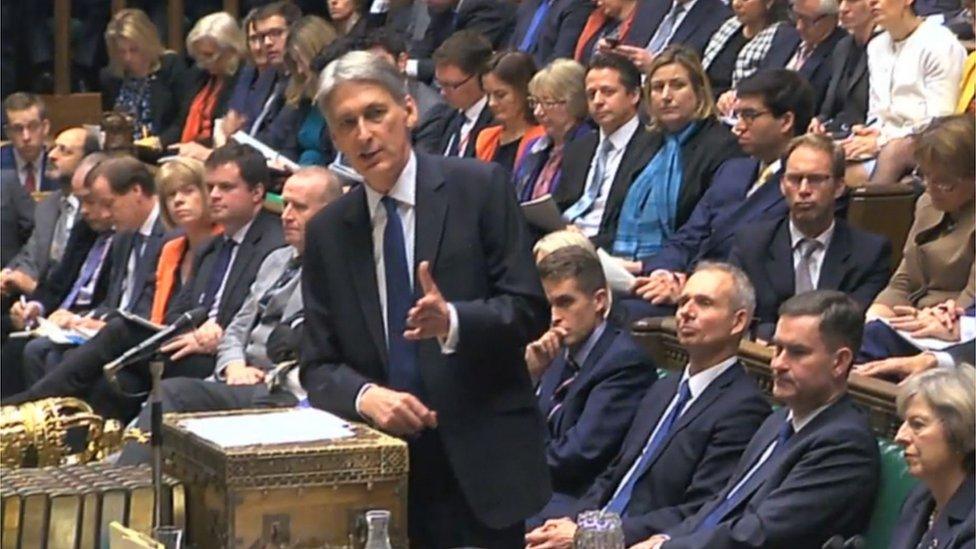Scottish Budget: Mackay pledges £240m for local services
- Published
Derek Mackay says the "historic budget" will see a freeze on the basic rate of income tax
Scotland's finance secretary Derek Mackay has pledged a funding increase of £240m for local services as he set out his draft budget.
But opposition parties said the amount of cash going direct to councils will be cut in real terms.
Mr Mackay also confirmed he will not change income tax rates or bands - but will not replicate the UK Treasury's tax cut for higher earners.
This means the 40% income tax rate will start at £43,430 in Scotland.
But it will start at £45,000 elsewhere in the UK.
The finance secretary also said £120m of government money will be given directly to schools, with head teachers deciding how the money will be spent.
The funding will replace plans to use council-tax revenues to tackle the attainment gap, with Mr Mackay instead stating local authorities will keep extra cash raised as a result of council-tax reforms.
The Scottish Conservatives said Scotland was now the highest-taxed part of the UK, and accused Mr Mackay of giving to councils with one hand while taking with the other.
And Scottish Labour leader Kezia Dugdale said Mr Mackay had "acted like a Tory chancellor" as she said his measures would cut £327m from council budgets.
Derek Mackay claims he is investing an extra £240m in public services
The ending of the council tax freeze in April 2017 will mean that local government leaders can increase the charge by up to 3%.
Mr Mackay insisted the proposed local government finance settlement and changes to local taxation would mean £240m of additional money to support local government services.
But while budget papers show a new chunk of cash going directly from the government to local services such as schools and social care partnerships, they also show a decrease in the pot of money that goes direct to councils.
Councillor David O'Neill, president of local government body Cosla, said it could "never endorse a reduction to the core local government settlement as announced as part of the budget statement today", and warned it would impact on local services.
The SLGP - which includes Aberdeen, Glasgow, Renfrewshire and South Lanarkshire councils - said Mr Mackay had used "smoke and mirrors to try and disguise the SNP's slash and burn economic strategy".

Analysis by Brian Taylor, BBC Scotland political editor
It depends, as ever, upon definitions. Should we talk about money for local government? Or money for local services?
If we consider cash for councils, then opposition parties can point to figures which indicate that the budget is down.
However, if we consider funding for services in the round, then ministers can point to figures which suggest that the level of financial support is up.
To offer a little more detail. Please turn to Table 9.02 in the Draft Budget document, external. It is on Page 91 in the book version. I know, I know, I sound like that maths teacher you disliked but bear with me.
This table cites Level 2 expenditure upon local government. Combining local government cash with central government grant support produces a cut of £327m from 2016/17 to 2017/18. That is the figure cited by Labour.
But, says the Scottish government, those are stripped-down stats. More info is available at Level 3 (Table 9.12, Page 101). That includes other funding streams and generates a cut of £182m across the relevant years.
But, says the SG a second time, that neglects other methods of providing funding for local services, albeit not necessarily through local authorities.
According to Mr Mackay, the entire package added up to "an increase in spending power on local government services" of £240.6m. Note his precise use of language.
All of this, of course, with an eye to next May's local council elections - in addition to the immediate impact. Will voters heed the cry of "council cuts"? Or will they listen to "service delivery"? And which one will they believe?

On income tax, Mr Mackay told MSPs that he was "sympathetic" to calls for the top rate for those earning more than £150,000 to be increased from 45p to 50p.
But he said: "In using the Scotland Act income tax powers for the very first time, we must have a balanced approach.
"Let me be clear, I will not pass the costs of UK austerity on to the household budgets of the lowest-income taxpayers."
Mr Mackay announced £60m for the first phase of the plan to expand early learning and childcare to 1,140 hours.
And he pledged a £3m package of "targeted" rail fare reductions "to ease costs for passengers and thank them for their patience" following criticism of the performance of ScotRail.
Business rates poundage will be reduced by 3.7% to 46.6p.
And 100,000 properties will be exempt from business rates under the small business bonus scheme by increasing the 100% relief threshold to £15,000.
Parties in Holyrood give their verdict on the Scottish budget
Mr Mackay said he would deliver on the SNP's commitment to protect the police resource budget in real-terms, and announced an additional £300m for the NHS resource budgets - £120m more than inflation.
The Scottish government will also use £47m to mitigate the bedroom tax and will "abolish" it at the earliest opportunity, Mr Mackay said.
The finance secretary said his budget would deliver £700m of additional spending on the economy and public services.
And he said he wanted to protect "vital local services", saying that there will be "no overall reduction" in local government funding.
But the finance secretary said Scotland's GDP was forecast to grow by about 1% in 2016-17 and 1.3% in 2017-18, compared to about 2% a year previously.
Among his other commitments were:
Completing the Queensferry Crossing
More than £470m of direct capital investment to begin delivery of 50,000 affordable homes,
More than £140m for Energy Efficiency programmes to help deliver climate change targets
More than £100m investment in digital and mobile infrastructure, to improve digital connectivity, grow the digital economy and increase digital participation
Scottish Conservative finance spokesman Murdo Fraser said his party could not support the budget proposals as they stand.
Mr Fraser said: "He (Mr Mackay) had the choice to use these new powers to support economic growth, and to tackle our underperforming economy.
"It is much to be regretted that he has chosen instead to hike taxes on families and businesses in Scotland, risking choking off economic recovery and depriving Scottish public services of vital tax revenue.
"This will make Scotland the highest taxed part of the United Kingdom, and as it stands this is not a budget we can support".
'Real terms cut'
Scottish Labour leader Kezia Dugdale said there would be a real-terms cut of £327m for councils, which would "rip the heart out of local services".
Ms Dugdale said: "However the finance secretary tries to spin it, today's budget means a real terms cut of £327m from the SNP government to local services.
"And they're making up the difference by holding councils to ransom - forcing them to use their tax powers, while they refuse to use theirs.
"They could have asked the richest 1% to pay a little more with a 50p tax, but they refuse."
The Scottish Greens said the draft budget was "modest in its ambitions when bold measures are needed to tackle poverty and protect public services".
And Lib Dem leader Willie Rennie welcomed the government's u-turn on the use of council-tax funds but said the budget fell "well short" of what was needed to improve educational attainment levels.
- Published14 December 2016

- Published14 December 2016
- Published23 November 2016
